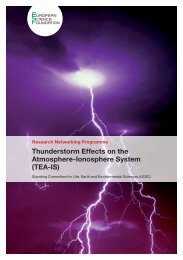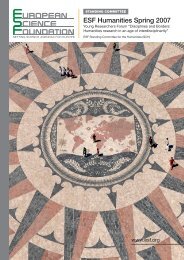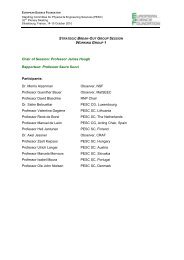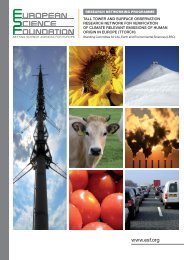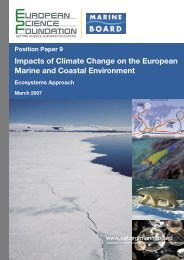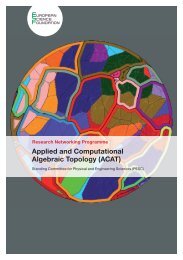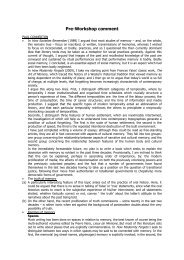Synthesis Report - European Science Foundation
Synthesis Report - European Science Foundation
Synthesis Report - European Science Foundation
You also want an ePaper? Increase the reach of your titles
YUMPU automatically turns print PDFs into web optimized ePapers that Google loves.
Basic researchClassical sectoral disciplinesEmphasis on expandingknowledgeApplied researchEngineering sciencesProduct orientationImplementation- and targetorientedresearchSustainability scienceGoal orientationProblem definitionsand discoveriesMono-disciplinary researchTop-down methodstheory – practiceTeams internal to scienceorganisationTechnical concept,products, processesInterdisciplinarityTop-down and / or bottom-upCooperation with industryHolistic solutions and strategiesInter-, multi- and transdisciplinarityBottom-up and top-downpractical researchStakeholder involvementEducation ofnext-generation scientistsPrototype developmentTable 1. The different kinds of research (Source: Moll and Zander, 2006)social and natural processes and their respectiveconsequences for each other. This suggests a renegotiationof the relationship between the humanities,social and environmental sciences that can fosternew research agendas suited to the policy requirementsfor the challenges of global change. Much hasbeen written on the problems and research questionsto be addressed in global change research, but farless attention has been devoted to the requirementsfor methodologies, methods and knowledge, datato address these challenges. A lack of appropriatemethodologies and knowledge is a key bottleneckin dealing with the global change challenges.There are powerful forces that maintain a strongresearch focus on the paradigmatic scientific role ofclimate and climate change, although global changeis ‘felt’ more through real (as opposed to global,average statistical) phenomena that are local (suchas water and food quality and availability), andthere are other global challenges (such as biodiversitydecline or energy and raw material availability).There are also deeply embedded assumptions thatphysical-numerical, computational models constitutea core technology to support policy, and thatquantitative data are to be prioritised relative toqualitative evidence, information and value-ladenjudgement. Incorporating human values, environmentalethics and social justice into the conventionalparadigm for analysis requires a radical adjustmentof worldview and scientific method (e.g., Hardin,1968; KLSC, 2011). There are also key assumptionsModels and instruments to supportdecision-making processesabout the relationship between science and policy(see also the previous section) – a belief that ‘sciencespeaks truth to power’ remains embedded in spite ofthe evidence of a much more nuanced, convolutedand globally diverse set of relationships.Methodologies in global change research needto be evaluated according to their inclusivenessand an absence of a priori framing that preventsthe integration of some kinds of knowledge. In thisrespect the dominance of large simulation models inglobal change research has to be assessed critically.Such models follow largely a positivist approach17and exclude certain traditions in the humanitiesand social sciences that follow more an interpretativeparadigm. The latter paradigm emphasisesembeddedness in contexts shaped by cultural, political,economic, social and institutional factors. Itoften employs qualitative methods and adopts an‘action research’18 perspective rather than that of17. Positivists believe that social reality is stable and can beobserved and described from an objective scientific viewpoint(Levin, 1988), i.e., without interfering with the phenomena beingstudied. Interpretivists contend that only through the subjectiveinterpretation of and intervention in reality can that reality be fullyunderstood. They look for meanings and motives behind people’sactions like behaviour or interaction with others. They criticisepositivists, because statistics and numbers cannot tell much abouthuman’s behaviour and sociology is not seen as a science.See www.sociology.org.uk/revgrm5.pdf, pjlor.files.wordpress.com/2010/06/chapter-3-draft-2011-04-152.pdf, www.justinkitzes.com/pubs/Khagram2010_EnviroCons.pdf, www.is.cityu.edu.hk/staff/isrobert/phd/ch3.pdf18. Action research is a reflective process of progressive problemsolving led by individuals working with others in teams or as part17Responses to Environmental and Societal Challenges for our Unstable Earth (RESCUE)




